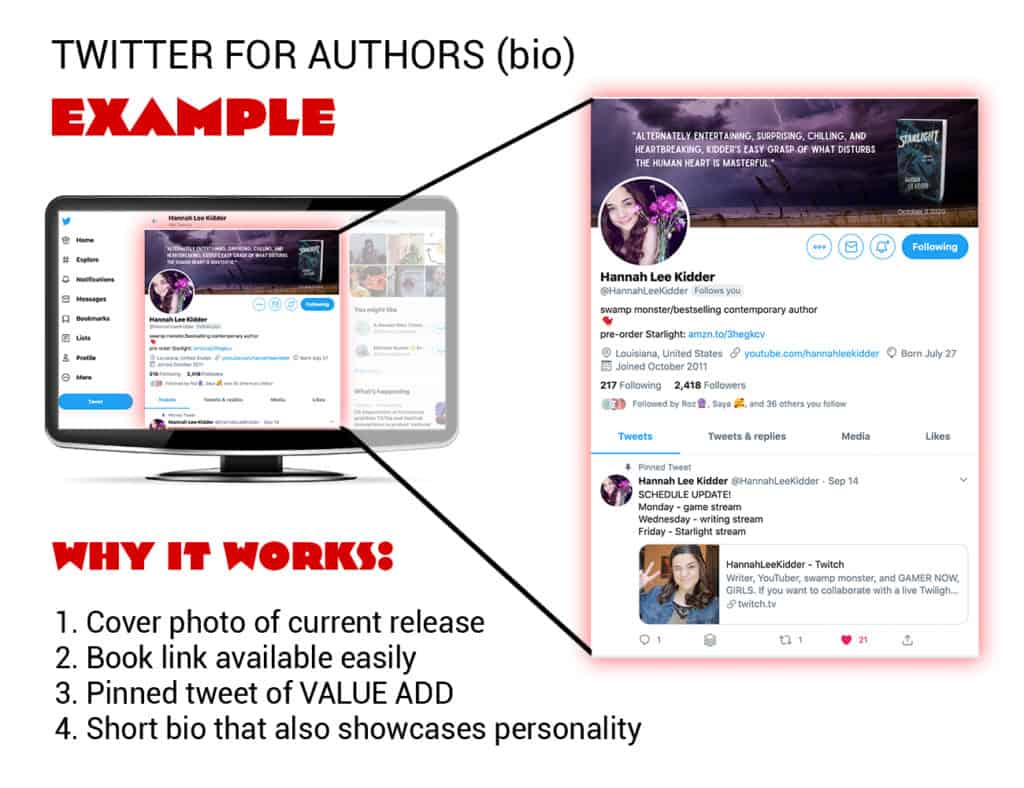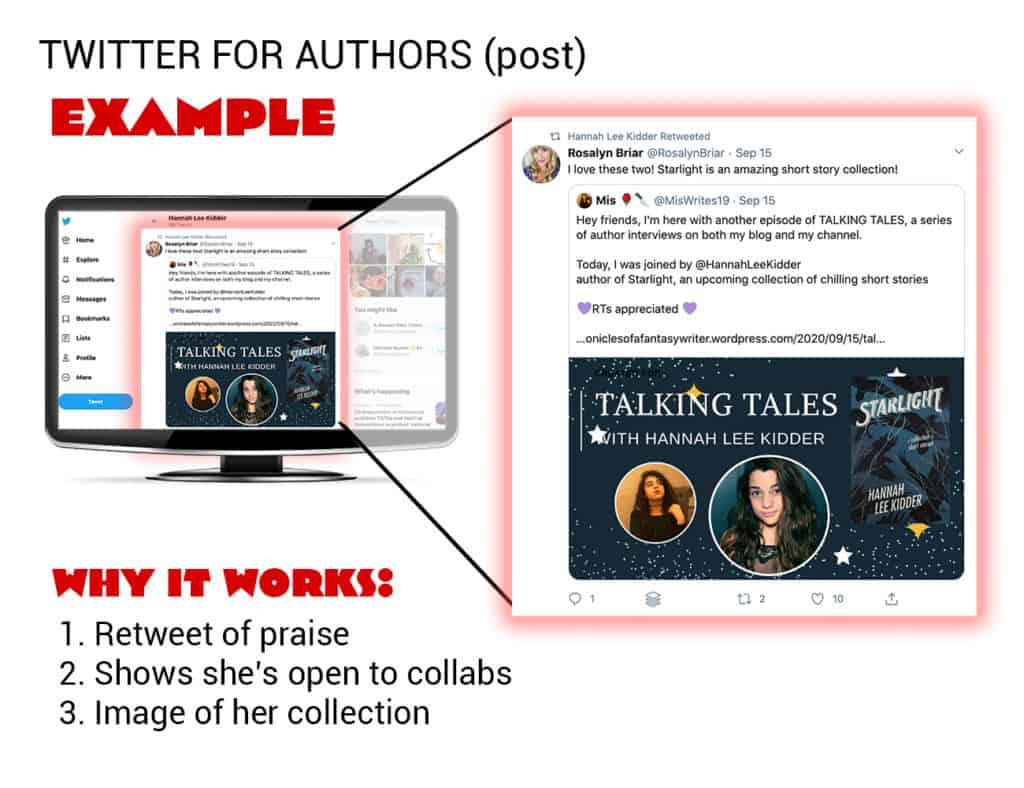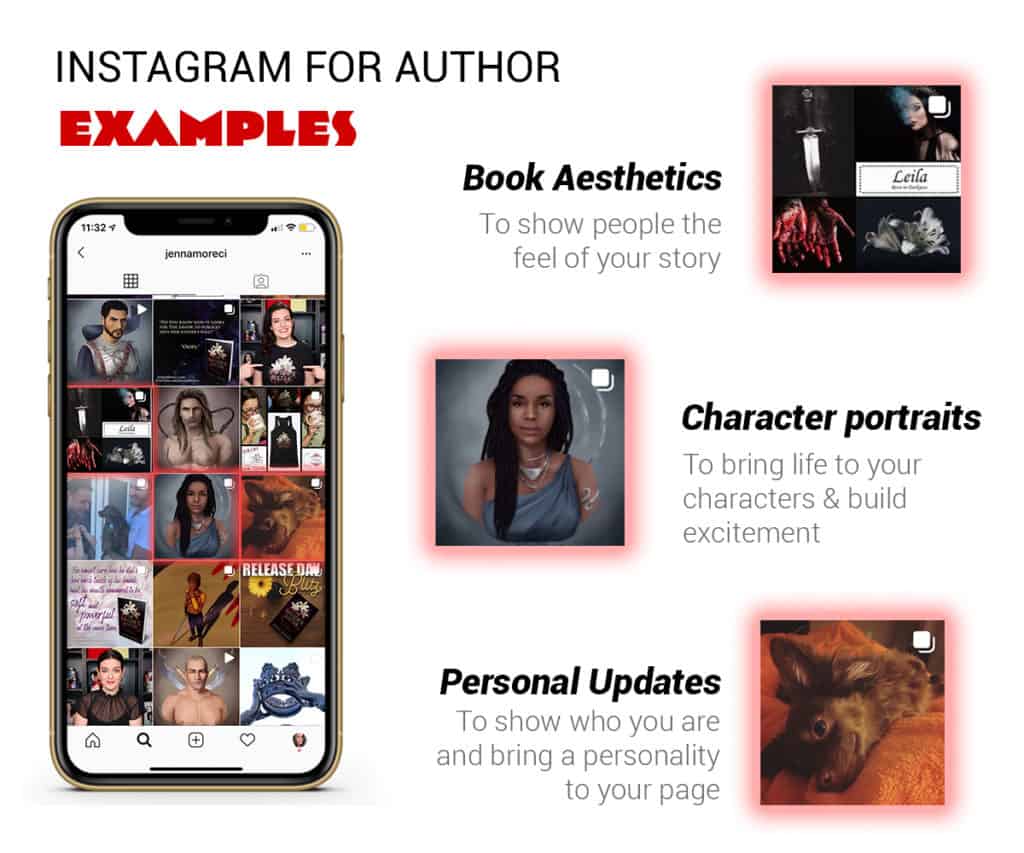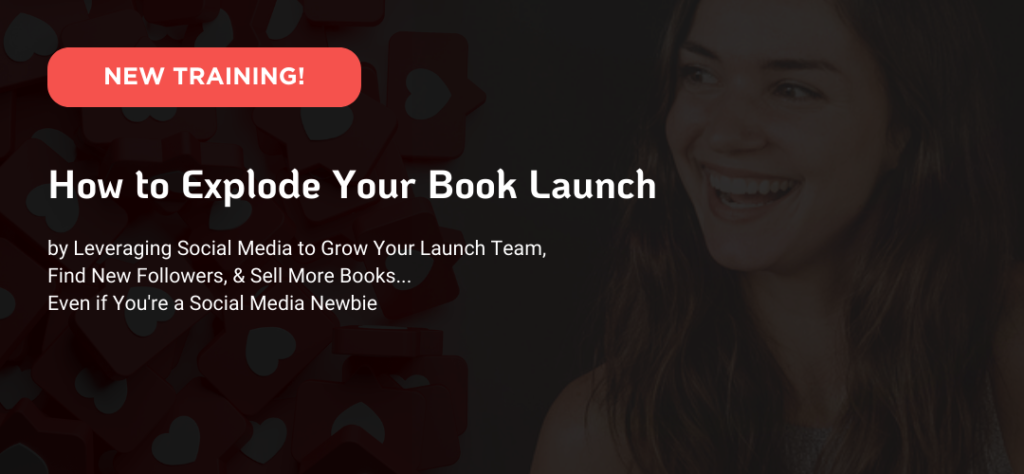Nowadays, if you want to be successful with your book, you have to know how to use social media for writers.
Marketing is one thing all authors will need to know how to do, no matter if you want to self-publish a book or traditionally publish. That’s right! Even traditional publishers are now looking to your SOCIAL PLATFORM as a decision-maker for buying your book or not.
And no matter your goals as an author, whether you want to write fiction full-time or want to use your book to grow your business, social media is important.
We’ll not only cover which social platforms are most important for authors right now, but also where to find your audience, and what content actually performs the best on each app.
Here’s how to do social media for writers:
- Do writers need social media?
- The difference with social media marketing
- What’s the best social media for writers?
- Twitter for authors
- Instagram for writers
- Facebook for writers
- TikTok for authors
- BONUS: Youtube for authors
- Author platform growth on social media
Do writers need social media?
Do you want to sell books? Do you want to make a career out of selling books?
Then yes, writers need social media. It’s for book marketing, and one of the most powerful types of marketing in this day and age.
This isn’t to say that you can’t sell books without social media. There are certainly people who do so, but unless you really know how to use ads or you get a lucky break and hit some charts in the rankings, (or are a student of our Sell More Books program where we teach those methods), your best bet for long-term success in writing is by building your author platform.
So while you don’t need social media, it increases your chances of long-term success exponentially.
The difference with social media marketing (especially for authors)
Social media is so different from “traditional” marketing methods. It’s not an email, it’s not a flyer in the mail or a commercial on TV, and it’s certainly not a radio ad.
What makes social media marketing different from other forms of marketing is that it’s personal.
It’s a person doing the marketing, very rarely a full brand speaking from behind a logo (though this does happen). With social media for writers, it’s certainly personal.
And this means that traditional methods of marketing a book are a bit different.
In fact, we’d say social media marketing is less about actually promoting your book and more about promoting your thoughts, ideas, and interests while keeping your book easily available.
This concept is a little confusing at first, but we’ll get into what this looks like with each social platform. But the main idea behind this principle is this:
If someone likes you and enjoys what you put out into the world, they’ll likely enjoy your books because of how much we place ourselves into them.
Yes, we even do this when writing a fiction novel. Our themes and messages come from within us, and when someone gets to know who you really are and likes that, they’ll probably like what you write about.
What’s the best social media for writers?
By and far, Twitter is extremely useful for anyone trying to have success as an author, especially as a self-published fiction author.
Does this mean it’s the best platform for you and your specific book? Not always.
While we recommend every writer be on Twitter, there may be other social platforms better suited for your audience. Meaning, certain people of varying ages and interests use different social platforms.
You’ll have to understand where your audience is if you want to operate on the best social media platform for you.
Thankfully, we cover those details below by going over the demographic of each platform (info by HootSuite) in detail so you can decide which will house your target audience, along with how you can connect with them.
Twitter for authors
As stated above, we believe all writers should be on Twitter. There is an extremely large fiction reading and writing community on Twitter, but it’s also really useful for nonfiction.
The struggle with a platform the size of Twitter (and really all of the ones we’ll cover below), is that they’re too big. It’s hard to find where your audience is. But that’s why we’ll also cover some useful hashtags to pay attention to.
HOW TO USE TWITTER FOR AUTHORS:
Each social platform is different. Depending on the people and its interface, different content will perform well.
For Twitter, it’s all about relatability. The posts that do the best are the one that speak to people directly, in a way they can relate to really well. It’s not really about you on Twitter, it’s about others.
So when you take to Twitter, remember that while it’s a social platform where you can divulge your own information, making all of your posts solely about you isn’t the right game here. We can save that for Instagram in a minute.
Demographic: 34% female, 66% male — 44% ages 18-24, 26% ages 30-49
Posting frequency: several times a day, 7+
Type of content that performs best: short relateable questions and statements
Hashtags to note: #amwriting, #writingcommunity, #WIP, #writerlife
Other hashtags for genre-specific depend on what you write and the niche (particularly for nonfiction, the examples above leave heavy for fiction users).
Examples:
Want to see a few author profiles on Twitter who are doing it really well? Here are some examples of social media for writers you can follow and emulate:

The reason this bio is really successful is because this author’s book is available, but it’s not spammy or pushing people to buy. Another reason is that her main bio is short, sweet, to the point, and also showcases her personality.

When it comes to sharing posts on social media, especially when “promoting” your book, it works best when the words come from others. We tend to not believe authors who say their book is great, because of COURSE they think that!
Retweeting praise for your book is one of the best ways to share proof and get others interested.
Instagram for writers
Instagram is one of those social media platforms you really have to mess with to get right. Meaning, some people can find great success with one strategy, and that same strategy won’t work for you—even if you do everything the same!
Part of this is because of the story feature, and that you have to actually put yourself out there on Instagram. While it does have a somewhat negative reputation for being “fake,” people do congregate here for connection and to follow people’s lives closely.
HOW TO USE INSTAGRAM FOR AUTHORS:
As mentioned, Instagram has more to do with daily life/lifestyle than it does only branded content. That, and memes. Yes! The meme culture has shifted somewhat away from Facebook and is ever present on Instagram’s platform, and now on the newer platform from Meta called Threads.
So what works here then? Relatable memes, intimate stories where you show up with energy, and “pretty” images on your main feed.
Remember that you’ll have to find out what works for YOU here. Does your audience wants to see more of you? Of what you’re reading? Of your book-writing process?
Demographic: 52% female, 48% male — 67% ages 18-29
Posting frequency: at least once per day on your main feed, several times on your story
Type of content that performs best: Stories! Getting on your story and showing you, your real face, your real life. On your main feed, aesthetically appealing images of your book, you, and your life will do best.
Hashtags to note: #amwriting, #writerlife, #writersofIG, #writersofinstagram, #bookrelease
Example:

Facebook for writers
Facebook’s seemingly everchanging interface has increasingly frustrated people. In truth, Facebook is dying as a means of self-promotion unless you pay for ads on their platform.
That being said, there are strategies that still work for Facebook for authors.
HOW TO USE FACEBOOK FOR AUTHORS:
Determine if you want to use a personal profile (not recommended), a page, or a group.
The main differences here are that a profile allows friends, a page allows for likes (and your stuff shows up on their feed like a profile’s would), and a group allows for a specific place for members to post and collaborate.
For writers, we usually recommend a page. But, if you are looking to build a brand, or maybe even an exclusive “club” for your readers, a group will get far better engagement than anything else. Facebook has continued to deprioritized page’s content, while boosting group posts.
It all depends on what your goals are as an author, and if your audience is even hanging out on Facebook.
Demographic: 79% ages 18-29
*Note on this: while this number reflects those who have Facebook, personal insights tell us the most active group of users is above 40-years-old.*
Posting frequency: 3 times per day max
Type of content that performs best: Images, videos
Hashtags to note: While Facebook has hashtag capabilities, they’re not really used to nearly the same extent as Twitter and Instagram
BONUS: Youtube for authors
Youtube isn’t for everyone. We’ll go ahead and say that right now. Not everyone has the presence for it, and not everyone will even like this style of platform building.
However, if it is something you’ve considered and need a push to start, it can be very lucrative as a secondary form of income, as long as a massive means of marketing your book—especially if you start “making it big” and gaining a lot of subscribers.
Our Youtube channel has over 40,000 subscribers and has grown immensely over the last year. We’ve seen this success first-hand, but we’re not the only ones.
There are several self-published authors who have used Youtube to quit their full-time jobs and pursue writing and creating videos.
HOW TO USE YOUTUBE FOR AUTHORS:
The first thing to think about here is what type of content you can post about, and what audience that will bring in. Many writers post videos with advice for writing books and publishing.
Others take the route of being on “Booktube,” where they read and post book reviews for other readers.
Each has their own pros and cons, but the bottom line with Youtube is that you have to be authentic, be something different (which can even simply come out in your own personality), and be consistent. One of the biggest common factors of success on Youtube is that people didn’t give up—they kept doing it through even a couple years of very slow growth.
If you are someone who’s not writing fiction and you’re looking to create awareness for a nonfiction or a book to grow your business, the topics you talk about should be related to your book.
Demographic: 81% ages 15-25
Posting frequency: two times per week, 1 time per week at a minimum if you want sustained growth and engagement
Type of content that performs best: videos, helpful tips, how-tos, relevant updates, reviews, etc.
There’s no doubt that TikTok is the hottest social media platform around right now. It’s especially popular with younger users. But is it a good choice for authors?
Although it’s one of the fastest-growing platforms at the moment, it remains to be seen if it will have the longevity of other platforms, as it’s both relatively recent and politically controversial.
TikTok for Authors
Here are some key facts related to TikTok.
TikTok total users 2 billion global
TikTok demographics – Activity – 100 million monthly active in USA, 50 million daily active in USA.
Gender and age – 50% of global audience under the age of 34 with 41% aged between 16 and 24, 56% male 44% female
How authors use TikTok
TikTok has rapidly emerged as one of the hubs for authors and readers alike. This phenomenon is known as BookTok and is worth exploring as a promotional avenue for your book. But what kind of content can you share on TikTok?
- The process of writing. TikTok is a great way to offer insight into your writing process. Give a glimpse into your life as an author and make yourself relatable in the process.
- Fun and comedy content. Much of TikTok’s most popular content is centred on comedy and getting laughs. Is there a lighthearted side to your life as a writer you could showcase?
- Social issues. A lot of users go to TikTok to learn about the social issues of the day. Could you tie in your book or your work as an author with a social cause that’s close to people’s hearts?
One of the best ways to see if TikTok is a good fit for your book marketing mix is to search the platform for authors you admire. What kind of content are they producing? Could you see yourself offering something similar?
Author platform growth on social media
By far the best tip we can give you is to be consistent. With social media, it really is all about showing up regularly with content your audience wants to see, whatever that may be.
And secondly, don’t be afraid to iterate and try new things. If memes aren’t working for you, try being more real and personal. If your Twitter one-liners just aren’t working, try asking more questions and creating polls.
The people who gravitate to your social platform will respond differently to content that might “work” elsewhere. Find what works for you, be generous in how you give content, and make your book easily available. If people like you, they’ll search for how to consume more of your goodies—you don’t really have to push to promote your book on social media.
